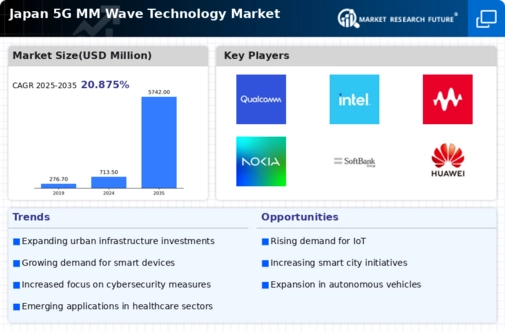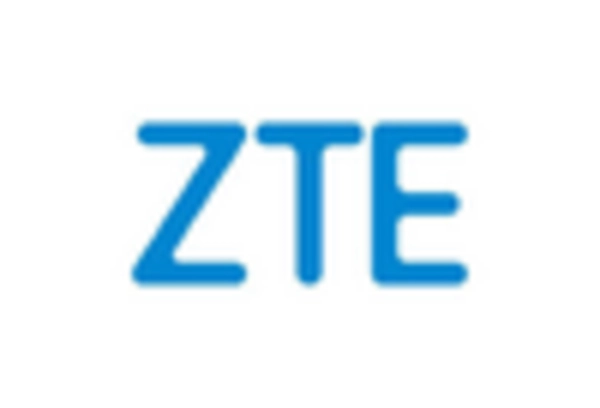Government Initiatives and Support
The Japanese government is actively promoting the development and deployment of 5g mm-wave technology through various initiatives and policies. This support includes funding for research and development, as well as incentives for companies to invest in 5g infrastructure. The government aims to enhance the country's technological capabilities and maintain its competitive edge in the global market. Recent reports indicate that public funding for 5g-related projects has increased by over 25% in the past year, reflecting the government's commitment to fostering innovation. Such initiatives are likely to create a conducive environment for the growth of the 5g mm-wave-technology market, encouraging collaboration between public and private sectors.
Expansion of Mobile Network Operators
The competitive landscape of the 5g mm-wave-technology market in Japan is characterized by the expansion of mobile network operators (MNOs) who are rapidly rolling out 5g services. Major players are investing billions of yen in enhancing their network capabilities to capture a larger market share. For instance, recent investments by leading MNOs have exceeded ¥1 trillion, aimed at expanding coverage and improving service quality. This aggressive expansion strategy is likely to drive consumer adoption of 5g services, thereby stimulating growth in the 5g mm-wave-technology market. As MNOs continue to innovate and enhance their offerings, the market is expected to witness increased competition, leading to better services and pricing for consumers.
Growing Interest in Autonomous Vehicles
The burgeoning interest in autonomous vehicles is emerging as a significant driver for the 5g mm-wave-technology market in Japan. As automotive manufacturers and technology companies explore the potential of connected and autonomous driving, the demand for high-speed, low-latency communication becomes critical. 5g mm-wave technology offers the necessary bandwidth and speed to support real-time data exchange between vehicles and infrastructure. Recent studies suggest that the automotive sector's investment in 5g technology could reach ¥500 billion by 2027, highlighting the sector's commitment to integrating advanced communication systems. This trend is likely to catalyze the growth of the 5g mm-wave-technology market, as it aligns with Japan's vision of becoming a leader in smart mobility solutions.
Rising Demand for High-Speed Connectivity
The 5g mm-wave-technology market in Japan is experiencing a surge in demand for high-speed connectivity, driven by the increasing reliance on digital services across various sectors. As businesses and consumers seek faster internet speeds, the adoption of 5g mm-wave technology is becoming essential. According to recent data, the demand for high-speed internet is projected to grow by approximately 30% annually, indicating a robust market potential. This trend is further fueled by the proliferation of smart devices and the Internet of Things (IoT), which require reliable and rapid data transmission. Consequently, telecommunications companies are investing heavily in upgrading their infrastructure to support this demand, thereby propelling the growth of the 5g mm-wave-technology market in Japan.
Technological Advancements in Communication
Technological advancements in communication technologies are playing a pivotal role in shaping the 5g mm-wave-technology market in Japan. Innovations such as beamforming, massive MIMO, and advanced antenna technologies are enhancing the efficiency and performance of 5g networks. These advancements enable higher data rates and improved connectivity, which are crucial for supporting the growing number of connected devices. As a result, the market is likely to benefit from increased investments in research and development, with companies striving to stay ahead in the competitive landscape. The integration of these technologies is expected to facilitate the widespread adoption of 5g mm-wave technology, further driving market growth.
















